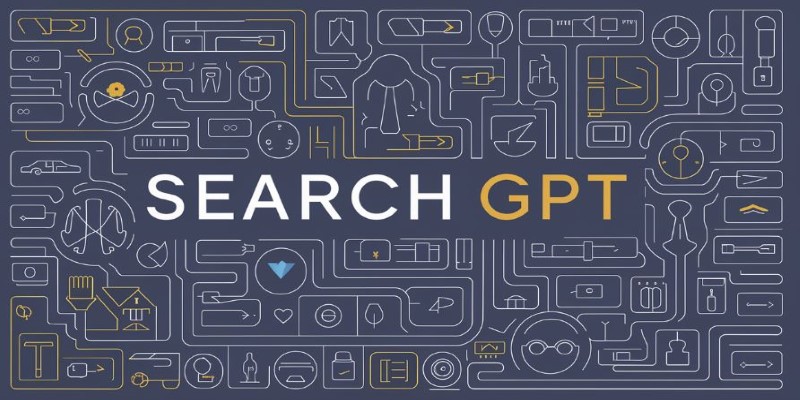The Future of Search: OpenAI Introduces SearchGPT
Sep 12, 2024 By Elva Flynn
Imagine a search engine that not only understands your queries but anticipates what you're really looking for, even when youre unsure how to phrase it. OpenAIs latest innovation, SearchGPT, promises to do just that. Moving beyond the limitations of traditional search engines, SearchGPT aims to revolutionize the way we explore the internet by using advanced AI to deliver not just results, but answers.

Whether youre hunting down obscure facts, solving complex problems, or simply trying to satisfy your curiosity, SearchGPT is designed to make the process faster, more intuitive, and eerily accurate. In this article, well explore how this new technology works, the impact it could have on how we interact with the web, and what the future holds for this groundbreaking tool.
The Birth of SearchGPT
OpenAI, a leading force in artificial intelligence research, has recently introduced its latest breakthrough: SearchGPT. This new search engine represents a significant departure from traditional search methods by harnessing the power of generative AI. Unlike conventional search engines that rely on static algorithms and keyword matching, SearchGPT leverages the advanced capabilities of GPT (Generative Pre-trained Transformer) technology. This shift allows for a more nuanced understanding of user queries and a more sophisticated approach to delivering search results.
The development of SearchGPT builds on the success of earlier models like GPT-4, which has already demonstrated remarkable abilities in natural language understanding and generation. By integrating these advancements into a search engine, OpenAI aims to create a tool that not only retrieves information but also interprets and presents it in a contextually relevant manner. This approach is designed to enhance the user experience by providing more accurate and insightful search results, marking a significant evolution in how we interact with digital information.
How SearchGPT Works?
SearchGPT operates on the cutting edge of AI technology, harnessing the power of generative pre-trained transformers (GPT) to revolutionize how search engines function. At its core, SearchGPT utilizes a neural network architecture known for its deep learning capabilities. This allows it to process and understand text with a level of nuance and context that traditional search engines often lack.

Unlike conventional search engines that depend heavily on keyword matching and link analysis, SearchGPT focuses on understanding the intent behind user queries. It breaks down complex questions into manageable parts, evaluates the context, and generates responses that are not only relevant but also insightful. For instance, if a user searches for information on a recent medical breakthrough, SearchGPT can synthesize data from multiple sources to provide a comprehensive summary rather than a list of links.
Moreover, SearchGPT's ability to engage in natural language processing enables it to handle conversational queries. This means users can ask questions in a more informal, natural manner, and SearchGPT will still provide accurate and relevant answers. Its advanced algorithms also allow it to learn from user interactions, continuously improving its ability to understand and anticipate user needs. This dynamic approach to search makes SearchGPT a powerful tool for delivering precise information efficiently.
The Impact on User Experience
The introduction of SearchGPT is set to transform the user experience in profound ways. Traditional search engines often present users with a long list of links, requiring them to sift through multiple sources to find relevant information. This process can be time-consuming and inefficient, especially when the exact information needed is buried deep within search results. SearchGPT aims to address this challenge by offering more direct and relevant responses to user queries.
By leveraging advanced AI technology, SearchGPT interprets user questions with greater context and nuance, providing answers that are more aligned with the user's intent. This means that users can expect to receive succinct summaries, direct answers, or comprehensive insights based on multiple sources, all within a single search result. This streamlined approach not only saves time but also enhances the overall efficiency of information retrieval.
Additionally, SearchGPTs conversational capabilities allow for a more interactive search experience. Users can engage in follow-up questions or refine their queries in real time, which helps narrow down results and obtain precise information. This level of interactivity not only makes the search process more intuitive but also facilitates a deeper engagement with the content. As a result, users can achieve their informational goals more effectively and with less effort.
The Future of SearchGPT
Looking ahead, the future of SearchGPT is brimming with potential and possibilities. OpenAI has ambitious plans to continuously enhance SearchGPT's capabilities, pushing the boundaries of what an AI-driven search engine can achieve. One exciting area of development is the integration of SearchGPT with other advanced AI technologies, such as voice recognition and real-time translation. This could enable users to conduct searches using natural language voice commands and receive instant, accurate translations of search results in multiple languages.

Additionally, there are prospects for expanding SearchGPTs abilities to handle multimedia content. Imagine searching for information based on an image or video, where SearchGPT could analyze visual content and provide relevant text-based information.
This would not only make searches more versatile but also significantly enrich the user experience. As technology progresses, SearchGPT may also see integration into augmented reality (AR) and virtual reality (VR) environments, offering a more immersive search experience. The future promises an even more interconnected and intuitive way to access and interact with information.
Conclusion
SearchGPT is more than just another technological advancement; it's a glimpse into the future of how we interact with information. By combining the intelligence of AI with the nuances of human-like understanding, OpenAI has created a tool that could fundamentally change the way we approach searching for knowledge. As with any innovation, there will be hurdles to overcome, but the potential to make the digital world more intuitive and accessible is immense.
Whether you're a casual user or a professional in need of precise information, SearchGPT promises to offer a more thoughtful, engaging, and efficient search experience. The dawn of this AI-powered search engine isn't just about finding answers; it's about redefining the very nature of discovery in the digital age.
-
 Mortgages Dec 04, 2023
Mortgages Dec 04, 2023The Best Ways To Handle Debt Collectors
The call from a debt collector may be very stressful and upsetting. Don't get worked up if a collection agency calls, however. Stop what you're doing, devise a strategy to deal with incoming calls, and pay off your debt if you must. When dealing with debt collectors, you must understand your rights. Consequently, if you can devise a strategy to deal with your debt collectors, let's go over what a debt collector may and cannot do under the law.
-
 Investment Nov 13, 2023
Investment Nov 13, 2023What Is a Marquee Asset? What You Need To Know
Large, diversified companies usually don't have marquee assets because they have fewer assets in resources and biotechnology. Instead, marquee assets tend to be owned by smaller companies with fewer assets in these areas. A junior exploration company's mineral property with many mineable resources could be one of its most important assets
-
 Know-how Jan 27, 2024
Know-how Jan 27, 2024Discovering Opportunities in Natural Gas Investments in 2024
Have an interest in knowing how to invest in natural gas? Find exclusive opportunities with key takeaways in a complete article.
-
 Banking Jan 18, 2024
Banking Jan 18, 2024Avoid Interest On Credit Cards
Credit card interest may be avoided by paying off your monthly debt in full, taking advantage of introductory offers of 0% APR, staying away from cash advances, and only using balance transfers when absolutely required.
